Gladius may look like a game based on Ridley Scott's Academy Award-winning film, Gladiator, but, in fact, the game's premise and its execution are both original. LucasArts' game is set in a world where mythological creatures, like minotaurs and ogres, are nearly as common as gladiatorial pit fights. This strategic role-playing game, appropriately billed as an "epic gladiatorial RPG," lets you build up a powerful squad of gladiators, ranging from small and lithe ones on up to extremely large and powerful ones. You then equip them with a seemingly limitless variety of weapons and armor. As your warriors gain experience, you can have them learn all sorts of special abilities, and using these to their fullest potential in battle is a process that never ceases to be challenging. Gladius is a long game that's somewhat similar to strategy RPGs, like this year's Final Fantasy Tactics Advance and Disgaea: Hour of Darkness, though, in truth, there's nothing quite like it. Some aspects of the game could have used some more polish, but these shouldn't deter anyone looking for a deep, involved, great-looking, and memorable RPG from getting Gladius.
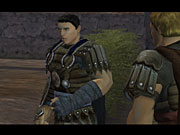
The game is set in a world reminiscent of ancient Rome and its outskirts. Factions similar to the ancient Romans, Norse, and Egyptians coexist in an uneasy stalemate, satisfying their violent cultural urges not by waging war, as they once did, but by competing in gladiatorial "games" in which mighty warriors, magic users, and beasts attack each other with everything they've got for the pleasure of the arena spectators. At the beginning of the game, you may choose from two main characters, a noble fighter named Valens and a strong-willed princess named Ursula (the two's destinies are intertwined). Valens is the son of one of Imperia's greatest gladiators and hopes to carry on his late father's legacy--and he hopes to discover why his father was murdered. Ursula is the daughter of the barbarian king of Nordagh, who encourages his son to look after her and encourages him to fight in the name of his country. The king suspects that by allowing Ursula to travel with her brother, she may be less of a conspicuous target for the witches who insist that the young woman is key to a ritual that will revive the "dark god." The plot will thicken both for Valens and Ursula but only as the two come closer and closer to becoming the greatest gladiators in all the land.
Like other strategy RPGs, Gladius is squarely focused on combat. As Valens or Ursula, you'll be able to travel from town to town on an overworld map, but the action takes place exclusively on the battlefield--and almost exclusively in organized tournament settings. The game's towns are nothing more than an interface for choosing from the various battles available in that location. The structure of the game is straightforward: You compete in leagues to earn cups; cups are earned by winning a number of matches within a league (not necessarily all of them). Once you've earned a sufficient number of cups, you may enter that town's tournament. If you win that town's tournament, you're one step closer to qualifying for the regional championship of that country. There are a number of different towns spread across four main regions. This may not sound like a lot of content offhand, but since the battles can be quite lengthy, by extension, so is Gladius. This definitely isn't a game you could finish in a weekend, even if all you did was play it.
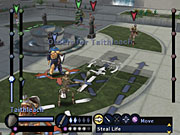
Different battles have different restrictions. You might be able to bring forth a half-dozen of your best gladiators or maybe just one or two. Depending on the league, you may be limited to gladiators of light, medium, or heavy weight; of male or female gender; of a particular nationality; of a particular religion/sect/cult; and more. Generally, this keeps things quite interesting. Though, at times, the restrictions can seem a bit severe. Certainly, they force you to build up a diverse group of gladiators, who will, in turn, take on many diverse opponents in different types of matches. The best and most common types of matches are the ones where you simply need to eliminate the competition. Some other match types include point matches, where you try to cause the most damage over time, and king of the hill, where you need to occupy a certain point for longer than your opponents. Regardless of the match type, the enemy AI mostly does a commendable job of competing against you. Sometimes foes will take the long way around, when things get crowded, rather than wait for their allies to get out of their way, but that's about the only noticeable flaw in the AI's strategy.
Your combatants gain experience points whenever they win a battle, though all your gladiators on the sidelines also earn a share. Gaining experience levels tends to noticeably improve your gladiators' prowess; they gain more strength, hit points, and other key stats, and they earn skill points, which you can spend on various special attacks, passive abilities, defensive maneuvers, and more. That, combined with the game's tremendous variety of items, means this is the sort of game in which you can spend lots of time just scrutinizing your forces, making satisfying decisions about how to develop their skills and how to equip them. You can even customize your gladiators' outfits to some extent. You also earn money by winning battles, but good equipment is always expensive enough to where you won't find yourself in the position of being able to buy all the best gear for all your gladiators.
You'll likely grow attached to some of your gladiators, who'll serve you well through countless battles and for countless hours. Fortunately, you needn't really worry about them dying on you. The game briefly explains that powerful healers are on the sidelines of all organized gladiatorial events, restoring fallen combatants to full strength. How convenient! In any case, you typically don't need to worry about losing your fine gladiators to a stroke of bad luck. Nor is it a problem if all your forces are wiped out. You can just try the battle again, though you may need to pay a small entrance fee with every attempt. There are a few exceptions. For example, it's possible (but not at all common) to stumble upon a random encounter while traveling between towns, and here, your troops are in mortal danger. Saving your progress in between towns will prevent anything truly bad from happening, though.

Gladius is quite open-ended. You can't advance to the next region until you've won all the tournaments in the region you're in, but you can travel to any of the towns in any order and take on the battles at your own pace. More importantly, you can choose to recruit whichever types of gladiators you wish. Towns tend to offer a good variety of viable recruits, whom you can hire on permanently or just for the duration of a single battle if you only need temporary assistance. Available recruits will always be of approximately the same level as the other gladiators in your party. This ensures that you'll always be able to find viable, new members for your team, but it also undermines the satisfaction gained from building up your forces. You won't feel quite as special about that 15th-level legionnaire in your squad, who joined you way back when he was a first-level wimp, since you could just recruit another 15th-level legionnaire if you wanted to. Also, aside from Valens, Ursula, and a handful of other main characters who star in the game's nicely done cinematic cutscenes, your gladiators don't have anything to do with the plot. Ironically, you'll probably find that Valens and Ursula aren't even your strongest warriors, but they'll still end up getting all the credit. Fortunately, they're likable characters.
The game's turn-based combat works very well and has a couple of interesting twists. It's complex but is explained effectively and quite thoroughly in the context of the beginning of the game. Characters move in order of their initiative scores, meaning smaller, lighter characters will get to move prior to and sometimes more often than larger, heftier ones. Some arenas have impassible terrain, high ground (from which the attacker has an advantage), and/or dangerous obstacles, but most arenas afford you with plenty of room to move your gladiators about. Some gladiators have ranged attacks, but most don't. If they do have a ranged attack, they need to move adjacent to their enemies to initiate an attack. In some cases, characters can move and attack in the same turn. Certain other, generally more powerful, abilities require a full turn. Special abilities require from one to five points to use. You start a match with a full five points, and you can never have more than five points. You recover one point each turn. This is a good, simple system that prevents you from overusing your most powerful abilities. Also, Gladius features a partial-turn system whereby characters may move farther than normal before their next turn for when you're trying to cover a lot of ground fast. This prevents any of the battles from becoming tedious cat-and-mouse games, especially since most arenas are relatively compact. These and other clever design decisions make Gladius' combat genuinely interesting.
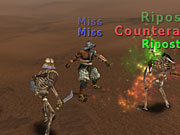
The combat has plenty of depth. As mentioned, gladiators can affiliate themselves with "affinity gods" who represent various elemental powers. If they spend skill points on affinity attacks and use equipment that earns them affinity points during a battle, they can unleash powerful, unblockable elemental attacks later into a match--and the same power that charges these attacks can be used to protect against them. Also, in addition to your gladiators' various special abilities, there's an inherent rock-paper-scissors-style balancing between heavy, medium, and light gladiator classes. It's not so pronounced that a medium class could never overcome a heavy class, or a heavy class could never hit a light class, but certain classes do have an advantage over others. This not only seems logical, but it also forces you to deploy your soldiers strategically.
Support classes, like archers and summoners, can further complicate matters since their ranged attacks can severely damage any foe, though they're usually not much of a threat up close. Another important consideration is your characters' facing. If an opponent is engaged with one of your troops and you manage to attack him or her from the side or back, you'll deal extra damage. Effective attacks also earn you more favor from the crowd. Favor gives your gladiators certain bonuses, from increased movement per turn all the way up to bonus critical hit damage. The positive effects of favor are always identical, but it's still a good system that encourages you to consider the momentum of a battle.
The most innovative aspect of the combat is the swing meter. Like something you'd find in a golf simulation, in Gladius, whether you use the simplest attack or the most devastating combo, you'll almost always have to properly time your button presses to make the most of it. There are different types of swing meters; most require you to hit a button at a precise moment to deal maximum damage. If you press too early, you won't hit nearly as hard, and if you press too late, you'll probably whiff the attack. Other types of moves require you to quickly "dial in" a random sequence of buttons to deal full damage, and one annoying type forces you to quickly alternate buttons as though you were playing the button-mashing arcade classic, Track & Field. At any rate, the timing on most of these is tuned just right, so that even after countless hours of play, you'll still have to work a little to make sure all your hits count. It would have been nice if there were even more types of swing meters, but the presence of this system serves to make the combat much more hands-on and more engaging than it tends to be in otherwise similar turn-based combat systems.
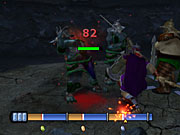
One consequence of the swing meters, and of the turn-based combat in general, is that Gladius isn't particularly fast paced. For a turn-based game, it does move fairly briskly. But since the vast majority of the game consists of one gladiator pit fight after another, and since you'll come to rely on the same sorts of moves over and over when you're nearing the end of the lengthy campaign, the game can occasionally feel too time-consuming. It doesn't help matters that loading times are frequent and fairly disruptive and noticeably break up the combat, the town interface, and the world map. Still, it's not like strategy RPGs are designed for those who like a quick fix from their games. For players who prefer a much richer, longer-lasting gameplay experience, Gladius' occasionally slow-paced gameplay shouldn't be a problem. These players should instead be warned that the gameplay here can be very addictive. Hours will pass in a flash as you work your way through the ranks.
For good measure, Gladius offers cooperative or competitive multiplayer options for up to four players on the Xbox and GameCube and two on the PlayStation 2. In the campaign, players can choose to take control of individual gladiators so that they can take turns fighting the AI. And, after you win your first regional championship, a competitive multiplayer mode is unlocked, which lets you pit your gladiator school against that of an opponent. You can choose from the various arenas you've visited and bring all your best troops to bear against your friends. It's a good bonus.
Gladius has a great look to it, thanks largely to the stylized, well-animated character models used for Valens, Ursula, and most all the characters in the game. There's also beautiful hand-painted artwork in some of the cutscenes. Despite being a turn-based game, Gladius succeeds in making its fully 3D characters look dynamic and lifelike, for the most part. During the game's story sequences, the characters exhibit a great deal of personality through their facial expressions, so it's too bad that you can't quite get a close look at them during battle, though the right analog stick can be used to rotate and zoom your viewpoint to some extent. The game's arenas mostly look good, too, though spell effects and such aren't all that special. There are also some clipping issues when characters are standing too close to obstacles. Only the Xbox version shows any blood on the ground after a hit connects, which seems appropriate for a game that revolves around people slashing each other with swords and axes. The Xbox version looks (and is) the best, overall, and it runs the smoothest--which helps give you a consistent feel for the swing meters. The PlayStation 2 version looks great, in its own right, but it's certainly not as sharp, smooth, or colorful as the Xbox version. The GameCube version is closer to the Xbox in terms of overall quality, but it's prone to a less consistent frame rate.
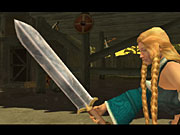
The game features an appropriately brassy, triumphant-sounding soundtrack, which is different for each region. Unfortunately, each region uses one main battle theme, and it's pretty brief, so you'll likely grow weary of hearing the same music over and over. In each fight, the music also changes when one side or another is about to win or lose, but these transitions are too abrupt. The game's voice acting is well done. Each of the character classes (most of which have a male and female counterpart) has its own voice and a few catchphrases, some of which are pretty clever. Yet some of the catchphrases repeat too often, and, despite how most of the sound effects are suitable for the game, some seem missing. For example, certain characters, when defeated, will drop their shields and weapons before they collapse, but you'll only hear the body--not the equipment--hit the dirt. Nevertheless, Gladius sounds pretty good overall.
If you're up for a deep, long-lasting, strategic gaming experience, then Gladius is perfect for you. Once you've played it for many hours, you'll spot little things about it that could have been fleshed out or polished up. However, at the heart of this game is an interesting and well-thought-out combat system, and there are so many viable combinations of characters and skills to experiment with that this game could easily keep you busy for much longer than most games do these days. The swing meters also add a refreshing bit of action to an otherwise fairly static style of gaming, which makes Gladius not just a great game but, in certain ways, a pioneering one.